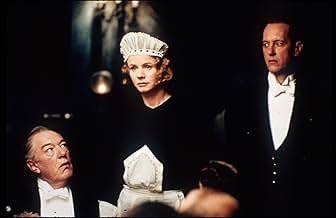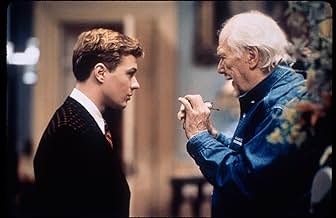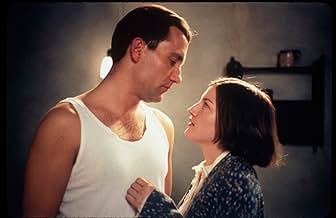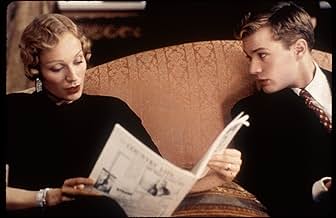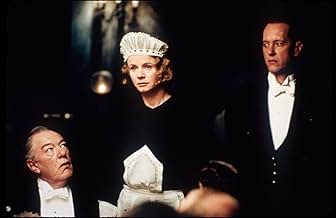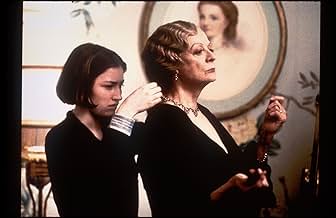Das Leben der Gäste im Obergeschoss und der Diener im Erdgeschoss auf einer Party 1932 in einem Landhaus in England, als sie einen Mord untersuchen, an dem einer von ihnen beteiligt war.Das Leben der Gäste im Obergeschoss und der Diener im Erdgeschoss auf einer Party 1932 in einem Landhaus in England, als sie einen Mord untersuchen, an dem einer von ihnen beteiligt war.Das Leben der Gäste im Obergeschoss und der Diener im Erdgeschoss auf einer Party 1932 in einem Landhaus in England, als sie einen Mord untersuchen, an dem einer von ihnen beteiligt war.
- Regie
- Drehbuch
- Hauptbesetzung
- 1 Oscar gewonnen
- 36 Gewinne & 74 Nominierungen insgesamt
Empfohlene Bewertungen
My plot summary suggests that this is a sort of murder mystery and that this will act as the driving force behind the narrative, however this is not the case and in reality the film is much more about the characters and relationships than it is about the murder. To this end the film will annoy some people who are perhaps not used to the sort of film that Altman produces and will be looking for the mystery aspect to be the all. However, I found the rather free-wheeling ensemble approach to be very enjoyable and the first hour moved quickly by thanks to the natural interactions and relationships and it was actually the mystery aspect that didn't work as well because it required too sudden a change in pace a change that the material seemed to resist and hamper. Despite this it does still work mainly because the Oscar winning writing brings out such convincing relationships and social politics, making it enjoyable and interesting throughout. The direction is great; the use of two cameras in group scenes means that the actors seem to flow around as naturally as their dialogue would suggest few seem forced to act to a fixed point and seem more realistic.
Considering the talent on board, it is not surprising that nobody really upstages anyone in particular and the ensemble feel is strong. Smith, Gambon, Thomas, Dance, Northam, Balaban and others make the upstairs fizzle with snobbery and unspoken resentments. Meanwhile the downstairs staff are just as well drawn and delivered by Mirren, Owen, Jacobi, Watson, Bates, Grant, Atkins and others. Stephen Fry is fairly minor within the plot but he is delightfully comic, even if he doesn't quite fit into the film that well.
Overall this is a classy film very much in the Altman style an ensemble piece of characters and relationships that we are left to drift within. Some viewers will find it frustrating that it takes so long to get to the point where the mystery kicks in but I actually found this to be the weaker aspect of the film and the most enjoyable parts were the well written characters and dialogue, which deservedly won Fellowes his Oscar.
Bob Balaban and Robert Altmann story idea combined with Fellowes's eloquent writing is first rate. The dialogues are filled with wit, humour and subtle depth. The mansion itself plays a key character in the story but it is the spellbinding cinematography that functions as the mansion's eyes. The camera is constantly on the move and the viewer feels like an ignored but curious member of the crowd. Many themes are tackled in the movie but it is done quietly. The film also slowly demonstrates the disintegration of the English class system (that started around the war).
Altman has assembled a mountain of talented actors that include a bitchy Maggie Smith, a pompous Michael Gambon, an obnoxious Kristin Scott Thomas, a vulnerable Camilla Rutherford, a desperate Tom Hollander, a devil-may-care Geraldine Somerville, a knows-where-he-stands Jeremy Northam, a douchebag Bob Balaban, a horny Ryan Phillipe, a stupid Stephen Fry, a loyal Sophie Thompson, a principled Helen Mirren, an enigmatic Clive Owen, a no-nonsense Emily Watson, a not-to-be-messed-with Richard E. Grant, a pulling-it-together Derek Jacobi, a frightened Alan Bates, a grumpy Eileen Atkins and an adorable Kelly Macdonald. 'Gosford Park' has one of the best ensemble cast.
I also loved the soundtrack. It is never overdone. The jazzy tracks contribute well in setting the atmosphere and there are some wonderful songs performed by Jeremy Northam's character.
In the beginning, it is a little difficult to keep up with the names of the characters which leads to a bit of confusion but with a little bit of patience, once you're over that, it becomes easy to follow. Like a beautiful painting, once it captivates the viewers attention it immediately involves them in an alternate world. From the start, you feel like an ignored guest and at the end it's as though the host has just seen you out.
Altman's preferences for kaleidoscopic social observation has sometimes failed in the past due to the weight of its own ambition: multi-plotted and multi-charactered snapshots of time and place held together by loose ties or a general thematic framework. Sometimes it pays off spectacularly (Nashville); sometimes it flatters to deceive (Short Cuts).
It works well here due to the necessary discipline of the single location and the greater opportunities for interaction among the characters this affords. Add to that an exemplary cast of (mostly) British character actors and a knowing script by Julian Fellowes that gives Altman's keenly observant camera plenty of time to make its own points.
Rightly, Altman is less concerned with the murder mystery, which is almost an aside, than with the opportunity given by a shooting party at a 1930s stately mansion to observe the English aristocracy and their servants in social interaction.
Never happier than when involved in a bit of human anthropology, Altman lightly dissects the complexities and hierarchies which go on both above and below stairs; in which many subtle and unsubtle rituals are played out among groups of people who clearly dislike each other but are forced through circumstance, need or employment to observe the fundamental social practices required.
1932 is also a time of intruding change into the nature of the old English ruling classes, slowly disintegrating in this between-wars period and, in this case, largely reliant on the wealth of one particularly reluctant patron to keep them in furs and flunkies. In on this act comes the (to them) faintly odious whiff of 20th century new money, represented by Hollywood and popular culture. These intruders are kept in their place, but the message is clear - change is coming, and coming fast.
The muted colours and autumnal setting continue this theme of a world in terminal decline and of a group of characters keenly conscious of place and tradition yet also wearied and exhausted by it. Only at the very end, when fundamental change has occurred and many characters are left to face up to very different destinies do we see a bit of sunshine creeping in, heralding the dawn of a new era.
The cast are all excellent, with special mention deserving of Maggie Smith's effortless scene stealing as a bitchy but broke old Countess; the ever reliable Jeremy Northam as matinee idol Ivor Novello, well aware of his place in the great scheme of things and young Kelly Macdonald in the pivotal role of Smith's harassed maid who's inquisitiveness rattles a whole load of family skeletons.
The film admittedly stinks as a murder mystery---it's almost funny how little Altman himself seems interested in the who-dunnit. But, typically for Altman, it's the deconstruction of the genre that he's interested in, not the genre itself. This movie isn't about a murder in a country house; it's a movie about class differences and people connecting (or not connecting) with one another.
It seems futile to mention stand out performances in a film filled to the rafters with stand-out performances, but I did especially like Emily Watson as a cheeky maid, Helen Mirren as the "perfect servant," and Kelly MacDonald as the novice lady's attendant who grows more than anyone else over the course of the film.
The film is at its best when it's probing the emotional depths of the story---it comes across as a bit too glib when the satire gets especially acidic (mostly with the Kristin Scott Thomas character), but like the best of his movies ("Nashville," "M*A*S*H," "Short Cuts") Altman knows how to control his own cynicism and doesn't let sarcasm rule.
With his on again-off again track record, we can expect the next Altman film to tank, so let's enjoy this one while we can.
The acting is superb, and this is a movie that really benefited from its great actors. Too often people will praise the acting of a film just because it has famous people in it, even of their talents weren't fully utilized for the characters they portrayed. But these characters were complex and it was those subtle aspects of the acting, the brief facial expressions, tones of voice, and other details that took the film to the next level.
Interesting character studies, an enticing mystery, a bit of humor, an homage to classic detective films, and a drama that gives you a glimpse of a very specific little world, one that you're probably not accustomed to. Those are the things you can expect from Gosford Park, and I highly recommend it.
Wusstest du schon
- WissenswertesThe camera is always moving (if only slightly) in every shot as requested by producer and director Robert Altman.
- PatzerThe movie takes place in 1932 but some of the songs Ivor Novello sings for the guests didn't come out until years after, like "Glamorous Night" (1935), "Why It Wasn't You" (1937), "I Can Give You a Starlight" (1939) and "Waltz of My Heart" (1939).
- Zitate
[Morris Weissman is asked about his upcoming movie project]
Lady Sylvia McCordle: Mr Weissman.
Morris Weissman: Yes?
Lady Sylvia McCordle: Tell us about the film you're going to make.
Morris Weissman: Oh, sure. It's called "Charlie Chan In London". It's a detective story.
Mabel Nesbitt: Set in London?
Morris Weissman: Well, not really. Most of it takes place at a shooting party in a country house. Sort of like this one, actually. Murder in the middle of the night, a lot of guests for the weekend, everyone's a suspect. You know, that sort of thing.
Constance: How horrid. And who turns out to have done it?
Morris Weissman: Oh, I couldn't tell you that. It would spoil it for you.
Constance: Oh, but none of us will see it.
- Crazy CreditsThe cast credits at the end are separated between above stairs, visitors and below stairs, arguably listed in order of status within the British class system.
- SoundtracksWaltz of My Heart
Performed by Christopher Northam
Composed by Ivor Novello & Christopher Hassall (as Christopher V. Hassall)
© Chappell/Music Limited
By Kind Permission of Warner/Chappell Music Ltd
Top-Auswahl
Details
- Erscheinungsdatum
- Herkunftsländer
- Offizieller Standort
- Sprachen
- Auch bekannt als
- Muerte a la media noche
- Drehorte
- Syon House, Syon Park, Brentford, Middlesex, England, Vereinigtes Königreich(interiors: upstairs bedrooms)
- Produktionsfirmen
- Weitere beteiligte Unternehmen bei IMDbPro anzeigen
Box Office
- Budget
- 19.800.000 $ (geschätzt)
- Bruttoertrag in den USA und Kanada
- 41.308.615 $
- Eröffnungswochenende in den USA und in Kanada
- 241.219 $
- 30. Dez. 2001
- Weltweiter Bruttoertrag
- 87.754.044 $
- Laufzeit
- 2 Std. 17 Min.(137 min)
- Sound-Mix
- Seitenverhältnis
- 2.35 : 1



